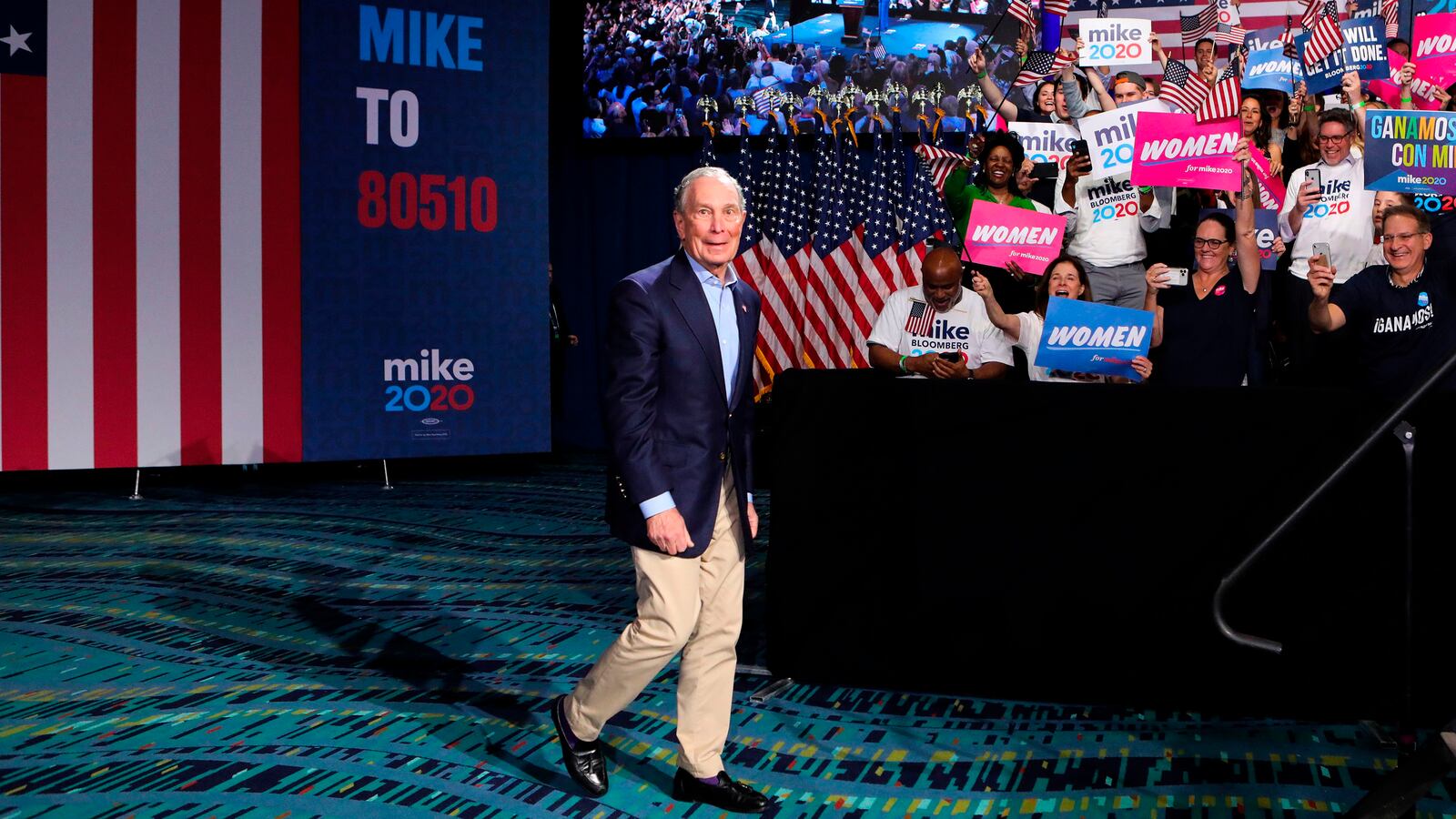WEST PALM BEACH, Florida—Mike Bloomberg stood inside a Florida convention center on Tuesday night looking at a crowd of strangers eating his food, drinking his wine, and waiting to celebrate a string of successes that would never come.
After walking on stage to U2’s “Beautiful Day” blaring from the speakers, he waved sheepishly at a group whose main cause to cheer at that point was that more than $463 million in self funding helped buy him a victory in American Samoa.
“No matter how many delegates we win tonight we have done something no one else thought was possible,” Bloomberg said. “In just three months, we’ve gone from 1 percent in the polls to being a contender for the Democratic nomination for president.”
Contender, of course, was a stretch. While the night was far from over and the prospect of more delegates loomed in his future, there would not be enough to win a state and likely not even enough to fill the ballroom where he stood.
He had come into the primary to be the solution to a party that couldn’t figure itself out. He could have been the Democratic savior, even though he wasn’t always a Democrat. He could have been the best chance to beat an incumbent president, even though he had never shown electoral success outside of New York City. His late entry to the race mattered only as much as one could try and avoid seeing his face and advertisements on a television screen.
By the time Super Tuesday votes began to come in, he had little to show for it.
Still, the voters inside his West Palm Beach event found plenty of reasons to defend the man who footed the bill. After all, Florida wasn’t on the Super Tuesday’s docket, and the state’s March 17 contest presents Bloomberg with another opportunity to see if his wealth can help him to a win.
“He’s sacrificing his personal time, energy, and fortune for the good of the country,” Jeff Lichterman, a 58-year-old Bloomberg backer, said. “So I admire him tremendously.”
His supporters also weren’t racing to urge the New Yorker to leave the race and concede the moderate lane to former Vice President Joe Biden.
“It's almost a why not?” Paul Warner, a 77-year-old Bloomberg supporter, said of him staying in the race. “He has both feet in so he might as well commit. Plus he can afford to do it.”
His wealth was on full display at the Palm Beach County Convention Center.
The older crowd that filled Bloomberg’s evening event were greeted by a tunnel of freebies, from a cascade of Bloomberg t-shirts to a slew of cups of Cabernet Sauvignon and cans of Budweiser and Bud Light on ice.
Mini cheeseburgers, short rib with a fontina cheese slider, and pulled chicken on a biscuit helped keep the crowd content as a DJ worked away on stage.
“This race is only just getting started,” a Bloomberg staffer said as the event began.
“We can’t be sentimental,” Judge Judy Sheindlin of television fame called to the crowd later. “This is not a time for a sentimental candidate.”
Never one to dwell on sentiment or convention himself, the 78-year-old former mayor skipped the first four states and bet the tail end of his political career on making something special happen on Super Tuesday.
So what if other attempts to skip the first four contests had failed? No other candidate had the personal wealth to fill the airwaves with a message of stability and competence.
But while television ads can make someone ubiquitous, they couldn’t save Bloomberg from facing the realities of the 2020 landscape: his rivals ready to pounce on his record with women and minorities, the candidate himself growing testy when pressed about how he fit into the race.
He was supposed to be the alternative to Sen. Bernie Sanders (I-VT), but Biden’s resurgence following the South Carolina primary couldn’t have come at a worse time for a billionaire trying to catch a break.
It wasn’t long before Bloomberg vocalized those gripes to reporters who joined him at several stops aimed at wooing Floridians.
“Joe's taking votes away from me," Bloomberg complained to reporters at the campaign’s Little Havana field office before declaring he had no intention of dropping out.
“I have no intention of dropping out,” Bloomberg said. “We’re in it to win it.”
After the Super Tuesday night event ended, packs of voters hung around to watch results come in on CNN. There was enough in the data for voters leaving Bloomberg’s production to cling to hope or find reason to worry about his downfall. Concerns about Bloomberg helping Sanders at Biden’s expense were voiced anew.
“I hope that he moves up and I would like him to be our nominee,” said Stacy Scheinberg, a 60-year-old Bloomberg supporter. “But if he’s taking away from Biden, we’ll have to see. I don’t want Bernie Sanders.”
For others like 77-year-old Ronnie Serlin, the Super Tuesday results were fast becoming critical to her voting decision. Watching CNN’s coverage, she said she hopes the former mayor throws his support behind Biden.
“I hope he mans up,” she said.







